
Broadforks for everyone
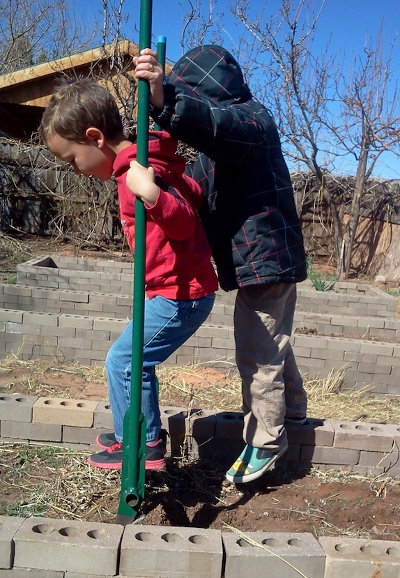 Our broadfork business began on a beautiful
July evening at our neighbors’ place, Plum Forest Farm. About fifty
people gathered around farmer Rob, who stood on a sunny slope,
surrounded by flowers, explaining his approach to growing produce.
It’s not easy to raise robust vegetables in our glacial till. Rob
is a soil expert; he understands soil biota, organic matter, and
building fertility over time. “I always use a broadfork to loosen
the soil and let the organic matter circulate,” he said.
Our broadfork business began on a beautiful
July evening at our neighbors’ place, Plum Forest Farm. About fifty
people gathered around farmer Rob, who stood on a sunny slope,
surrounded by flowers, explaining his approach to growing produce.
It’s not easy to raise robust vegetables in our glacial till. Rob
is a soil expert; he understands soil biota, organic matter, and
building fertility over time. “I always use a broadfork to loosen
the soil and let the organic matter circulate,” he said.
“Where can I get one of those?” asked a
class participant. “Bob Powell makes them,” said Rob. Fifty
people turned their heads to look at my husband Bob. He looked around
at their expectant faces. “Sure, I could make a few more,” he
said.
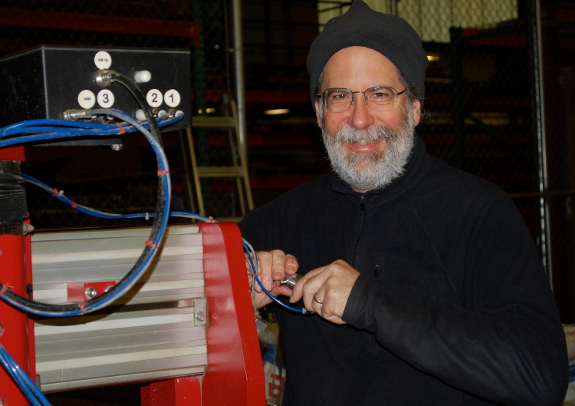
Bob with his Omax machine.
Bob’s an inventor. A computer engineer by
training, he’s always loved making things out of metal. His
lifelong hobby became a business in 2007, when he acquired a
water-jet cutting machine and started fabricating tools and making
parts for artists and builders.
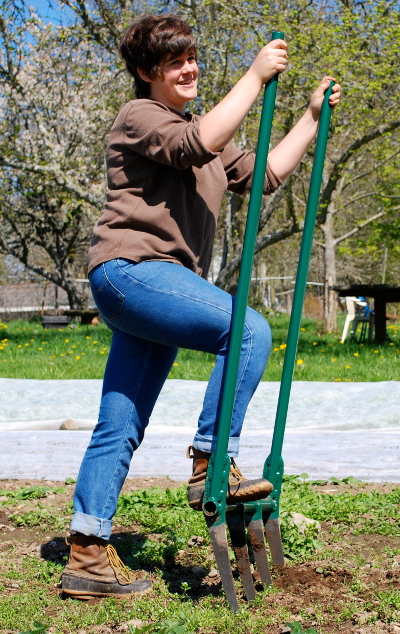
We live on Vashon Island, near Seattle.
Farms here are extremely small-scale, and local growers do a lot of
work by hand. One neighbor asked Bob to fix a broadfork, then he
built a couple for our neighbors who needed one that wouldn’t
break, and after this class we had nine orders. So he refined the
design, and made some broadforks, and we sold them to people that we
knew, for cash or barter for vegetables. I used mine to cultivate the
raspberries and prep a squash bed. It made it easy to weed, and
helped the manure get down to the roots, and the plants did great.
We got some feedback on the design. Could
the tines be curved? The original tool was a bit heavy. Bob realized
he could cut the parts more efficiently, too. He changed the pattern,
made it lighter and easier to use, and put them up on his web page.
As it turned out, plenty of people want a sturdy broadfork.
Different-size people need different-size forks; we ended up with
three models, the smallest weighing just 15 pounds.
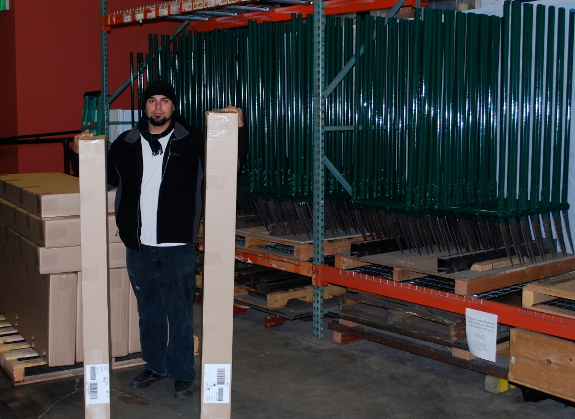
Jared with broadforks ready to ship.
So then we had a business. We got busy
designing packaging, logo, web page, advertising – it never ends.
If you’re starting a manufacturing business, my advice is to hire
professionals for the parts you don’t know about, and expect to
spend a lot of time negotiating with your shipper.
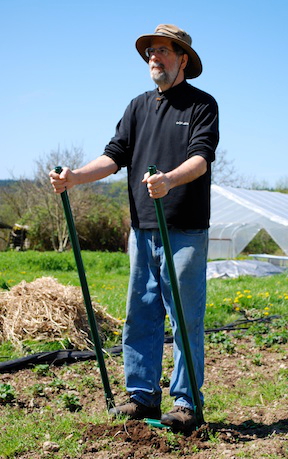 We still build our Meadow Creature
broadforks on Vashon Island, paint them by hand, and ship them all
over the US. They’re made of steel, remarkably easy to use, and
will break up the hardest hard pan and loosen the rockiest soil. We
also make the Avalon cider press, and soon we’ll have a farmstand
cash box ready to go.
We still build our Meadow Creature
broadforks on Vashon Island, paint them by hand, and ship them all
over the US. They’re made of steel, remarkably easy to use, and
will break up the hardest hard pan and loosen the rockiest soil. We
also make the Avalon cider press, and soon we’ll have a farmstand
cash box ready to go.
One of my favorite parts of our business is
our broadfork donation program. All over the country, people are
learning to grow their own food, teaching each other to garden, and
raising food for people who need it. We’ve donated over 100
broadforks to school gardens, community gardens, food banks, and
congregations. I love hearing from the people who are growing food in
cities, on old ballfields, in suburban neighborhoods, next to small
town libraries, and in remote hamlets. It’s empowering, practical,
and fun; one of the sanest things going in our country right now. To
request a donation, see our MeadowCreature.com
FAQ page for details.
I use my broadfork to cultivate the
blueberries and raspberries, pull out broom and other invasives, turn
grass turf into garden beds, dig out dock, loosen the beds in spring
so the compost will get into the soil, and harvest garlic and
carrots. If you’d like one of your own, find us online at
MeadowCreature.com, or give us a call (360-329-2250).
Want more in-depth information? Browse through our books.
Or explore more posts by date or by subject.
About us: Anna Hess and Mark Hamilton spent over a decade living self-sufficiently in the mountains of Virginia before moving north to start over from scratch in the foothills of Ohio. They've experimented with permaculture, no-till gardening, trailersteading, home-based microbusinesses and much more, writing about their adventures in both blogs and books.
Want to be notified when new comments are posted on this page? Click on the RSS button after you add a comment to subscribe to the comment feed, or simply check the box beside "email replies to me" while writing your comment.
- Remove comment
